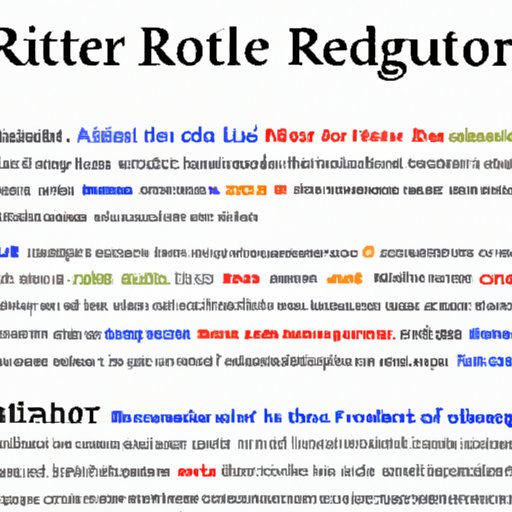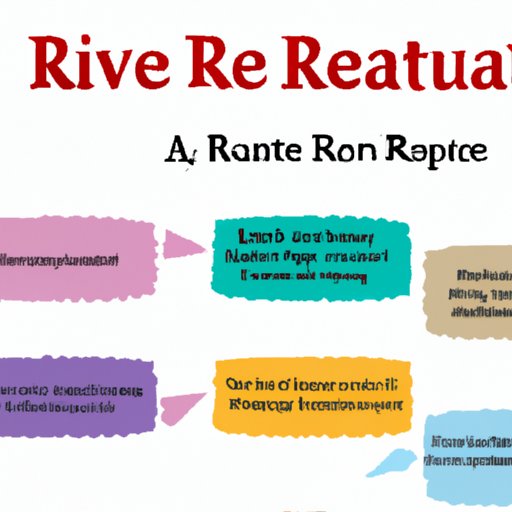Introduction
A literature review is a critical summary of existing research related to the topic under investigation. It is a comprehensive overview of all the knowledge available on a specific topic, providing a description, summary, and critical evaluation of the sources. The purpose of a literature review is to present the current state of knowledge on a topic and to identify areas of further exploration.

Exploring the Significance of Literature Reviews: Analyzing their Purpose and Benefits
Conducting a literature review can be an important part of the research process, as it helps to identify gaps in knowledge, determine trends in the field, and develop new ideas for future research. In addition, a literature review can provide valuable insight into the research methods used by other scholars in the field and help to refine the research question or hypothesis.
What Are the Benefits of Conducting a Literature Review?
A literature review can benefit researchers in various ways. It can help them to identify relevant theories, locate source materials, and understand how their research fits into the broader context of the field. In addition, conducting a literature review can help researchers to better understand the research methods used by other scholars in the field, and gain insight into the strengths and weaknesses of past research.
How Do Literature Reviews Help in Research?
A literature review can be an invaluable tool in the research process. It can help researchers to identify gaps in the existing body of knowledge, make connections between different pieces of research, and develop new ideas for future research. In addition, a literature review can provide valuable insight into the research methods used by other scholars in the field, and help to refine the research question or hypothesis.
How to Write a Comprehensive Literature Review: A Step-by-Step Guide
Writing a comprehensive literature review requires careful planning and organization. The following steps will help you to create an effective and comprehensive literature review:
Selecting Your Focus and Identifying Sources
The first step in writing a literature review is to select your focus and identify sources. Start by selecting a specific topic or area of interest and then identify relevant sources that discuss this topic. This can include books, journal articles, dissertations, conference papers, and other published works. Make sure to include both primary and secondary sources in your review.
Organizing and Structuring the Literature Review
Once you have identified your sources, the next step is to organize and structure the literature review. Begin by grouping similar sources together and creating an outline of the review. This will help you to identify themes and patterns in the literature and make it easier to write the review. Additionally, it is important to consider the scope and depth of the review and ensure that all relevant sources are included.
Writing the Literature Review
After organizing and structuring the literature review, the next step is to begin writing. Start by providing an overview of the topic and introducing the main themes and arguments. Then, move on to discussing each source in detail and analyzing the evidence presented. Finally, draw conclusions about the overall state of the literature and identify areas of further exploration.
What is the Value of a Literature Review? Examining its Role in Academic Research
A literature review is an important component of academic research, as it helps to identify gaps in knowledge and generate new ideas for future research. In addition, it can provide valuable insight into the research methods used by other scholars in the field and help to refine the research question or hypothesis.
How Does a Literature Review Benefit Academia?
A literature review can benefit academia in several ways. It can help to identify gaps in the existing body of knowledge, make connections between different pieces of research, and develop new ideas for future research. In addition, a literature review can provide valuable insight into the research methods used by other scholars in the field, and help to refine the research question or hypothesis.
The Role of Literature Reviews in Generating New Knowledge
Literature reviews play an important role in generating new knowledge. They can help researchers to identify gaps in the existing body of knowledge, make connections between different pieces of research, and develop new ideas for future research. In addition, a literature review can provide valuable insight into the research methods used by other scholars in the field, and help to refine the research question or hypothesis.
The Essential Elements of an Effective Literature Review
In order to write an effective literature review, there are certain elements that must be included. These include critical thinking, synthesis, and clarity. Critical thinking involves analyzing and evaluating the sources, synthesis involves combining the information from the sources to form a unified whole, and clarity involves expressing the ideas in a clear and concise manner.
Critical Thinking
Critical thinking is an important element of a successful literature review. This involves analyzing and evaluating the sources, looking for patterns and discrepancies, and drawing connections between different pieces of research. In addition, it involves questioning assumptions and examining the evidence presented.
Synthesis
Synthesis is another important element of a successful literature review. This involves combining the information from the sources to form a unified whole. This can involve summarizing and synthesizing the information from the sources, making connections between different pieces of research, and drawing conclusions about the overall state of the literature.
Clarity
Finally, clarity is an essential element of a successful literature review. This involves expressing the ideas in a clear and concise manner. It is important to avoid jargon and overly complex language, and to clearly explain the key points and arguments.

Understanding the Power of Literature Reviews: Their Uses and Impact on Scholarship
Literature reviews are powerful tools that can be used to support scholarship in various fields. They can help to identify gaps in the existing body of knowledge, make connections between different pieces of research, and develop new ideas for future research. In addition, they can provide valuable insight into the research methods used by other scholars in the field and help to refine the research question or hypothesis.
How Do Literature Reviews Support Scholarship?
Literature reviews can be an invaluable tool for supporting scholarship in various fields. They can help to identify gaps in the existing body of knowledge, make connections between different pieces of research, and develop new ideas for future research. In addition, a literature review can provide valuable insight into the research methods used by other scholars in the field, and help to refine the research question or hypothesis.
The Impact of Literature Reviews on Future Research
Finally, literature reviews can have a significant impact on future research. By identifying gaps in the existing body of knowledge, making connections between different pieces of research, and developing new ideas for future research, literature reviews can help to shape the direction of future research in a particular field.
Conclusion
In conclusion, a literature review is an important component of academic research. It can help to identify gaps in the existing body of knowledge, make connections between different pieces of research, and develop new ideas for future research. In addition, it can provide valuable insight into the research methods used by other scholars in the field and help to refine the research question or hypothesis. Writing a comprehensive literature review requires careful planning and organization, as well as critical thinking, synthesis, and clarity. Finally, literature reviews can be an invaluable tool for supporting scholarship in various fields, and can have a significant impact on future research.
(Note: Is this article not meeting your expectations? Do you have knowledge or insights to share? Unlock new opportunities and expand your reach by joining our authors team. Click Registration to join us and share your expertise with our readers.)
